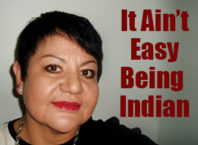I moved to Minneapolis in the Summer of 1994 after I finished my undergraduate degree at the University of South Dakota. I fell in love with ‘The Cities’ the summer I worked at ValleyFair. This was the place where social and political movements began. This place was progressive. I moved here to be a part of it.
I got a job in the Native community and worked at a social service agency with Native people. I was excited. I was ready to make a difference. After a few months, reality set in. My college education didn’t prepare me for our community, the depth of pain. The urgency of what stared back at me was overwhelming.
The tools I was taught were Western tools that didn’t fit Native cosmology or thinking. I had to learn coping mechanisms, thriving tools, and the tenacity for survival we’ve learned over generations. All of these survival tools helped us endure centuries of ethnic cleansing, genocide, and conformity.
Throughout my tenure at this organization I learned that professional boundaries were a western concept, cause community norms created an alternate perspective. Families worked with families. Organizational dynamics became family dynamics. Boundaries, expectations, and rules were dictated by family systems.
When it was time to leave the organization for another opportunity I learned the consequences of seeking other opportunities. I’d like to say that I was given a big party with presents, cards, well wishes, and hugs. Unfortunately, my experience was of alienation and bad mouthing. It was confounding. People I came to know as family, my friends, and mentors were saying horrible things about me. When I confronted this behavior, I was met with silence.
It wasn’t until later that I learned that some people are incapable of saying Good bye. This process delves into their abandonment issues. They cope by creating situations that disassociate you and make you into a bad character. They are able to move on. As a young person, I found this process disheartening and confusing.
I learned over the years of consulting was that organizations are living beings that are embodied by the people that inhabit them. The psychological health and well being of the organization is that of the leadership. If the leadership of an organization fails to take care of their own personal needs then they are manifested in the business practice of the organization. Often times, when I was called to consult with an organization I found myself negotiating interpersonal dynamics that failed and communication that derailed.
Lateral violence is real. Laterial violence is displaced physical, emotional, or spiritual violence directed at peers rather than one’s true adversaries. Simply speaking, ‘it’s the crab in the bucket mentality’. When our lives are filled with struggle and we see another Native person thriving then we deliberately, oftentimes unconsciously, seek to terrorize them by gossiping, being mean spirted to them, alienating them, etc. In organizations, lateral violence happens and is real. Tolerance for it is led by the leadership. If an organization is unhealthy then follow the trail and it will lead you to the leadership of the organization.
It’s taken me many years to heal from the initial trauma I endured working at my first Native organization. I don’t harbor any ill will to that organization. I’m an adamant supporter of it.
I learned the following are examples of what made a successful business:
- Value people
- Value varied opinions
- Create and support an organization that enables a constructive dialogue
- Take care of your personal life – Physical, Spiritual, Emotional health
- Leave work at work
- Build new reflective leadership
- Hold leaders accountable for their unhealthy behavior
- Professional boundaries are important to health
- Organizations must change to continue to be relevant
- Native culture is essential in the day to day operations of an organization.
Over the years, as a business consultant, I learned to understand Native businesses for the social, cultural, and political systems they exist in. They are not immune to the realities of historical trauma, unclear expectations, adaptive boundaries, and ethical conduct. Stewardship of these organization is the responsibility of the leadership of that organization.
Native businesses exist in multiple cultures. Inherent in this coming together of these cultures is a tension. It takes a reflective leadership to understand the nuances of what is occurring. I’ve come to believe as we continue to live and thrive in multiple cultures so will our institutions we establish to help us.





